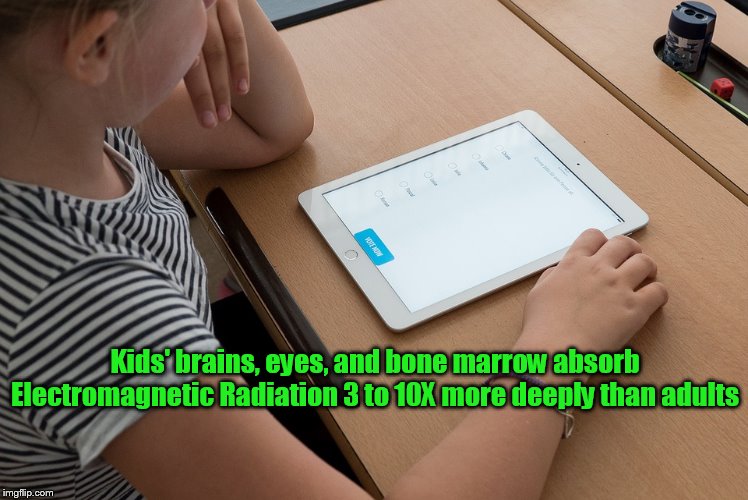 By B.N. Frank
By B.N. Frank
American tech insiders (aka “Silicon Valley Parents”) have been limiting their own children’s use and exposure to screens for years. They send their kids to low-tech and no-tech schools, make their nannies sign “no screens” contracts, and spy on their nannies to make sure they aren’t breaking those contracts (see 1, 2, 3, 4).
Of course, studies revealing that kids are adversely impacted by screen use and exposure have been published for years also. For those keeping track, here’s another one from Study Finds:
Toddlers who spend under an hour in front of screens develop better brains
CHAMPAIGN, Ill. — Keeping toddlers off the iPad and encouraging them to run around and get some fresh air may help their brain in the long run. A new study finds that regular physical activity and less screen time is key to developing a toddler’s executive function, including their ability to pay attention, shift between tasks, and learn to make good decisions.
Moreover, the study shows that children around two years old who spent less than an hour a day on electronics and exercised daily showed better cognitive skills than those who did not, according to scientists at the University of Illinois Urbana-Champaign.
“Executive function underlies your ability to engage in goal-directed behaviors,” explains Naiman Khan, a University of Illinois Urbana-Champaign kinesiology and community health professor and study author, in a statement.. “It includes abilities such as inhibitory control, which allows you to regulate your thoughts, emotions and behavior; working memory, by which you are able to hold information in mind long enough to accomplish a task; and cognitive flexibility, the adeptness with which you switch your attention between tasks or competing demands.”
The findings are in line with diet and physical activity recommendations from the American Academy of Pediatrics (AAP). Their guidelines advocate for less than 60 minutes of looking at screens every day, daily physical activity, eating five or more servings of fruits and vegetables, and avoiding or at the very least, not drinking as many sugary drinks. Previous research found that children who adhered to the AAP recommendations showed better executive function in adolescence. The team sought to find when this relationship begins, and whether it starts as early as toddler age.
The 356 toddlers enrolled in the study were part of a separate project called the “STRONG KIDS 2” study, which includes looking at what factors influence a child’s dietary habits and weight from birth to five years old. The researchers used parental surveys and data on the children that was collected over five years, including when the children were two years old.
Parents filled out a survey on their child’s behaviors such as the average time they’re looking at screens, how physically active they are, and what type of food they usually eat, and whether they drink alot of sugar-sweetened drinks. The survey also asked questions regarding their toddlers’ executive function. These questions related to the child’s thought-planning process, how they manage emotional responses, impulse control, memory, and attention between tasks.
The study reveals an indirect relationship between screen time and executive function. More specifically, toddlers with less than a hour of screen time daily were more likely to control their cognitive responses than those who spent most of their days looking at phones or televisions. “They had greater inhibitory control, working memory and overall executive function,” explains Arden McMath, a graduate student at the University of Illinois Urbana-Champaign and study coauthor.
Toddlers who had some daily physical activity also did better on tests involving working memory than those who did not. However, there was no relationship found between a child’s weight or executive function. “The influence of engaging in healthy behaviors on cognitive abilities appears to be evident in early childhood, particularly for behaviors surrounding physical activity and sedentary time,” says Khan.
The study is published in The Journal of Pediatrics.
Activist Post is Google-Free
Support for just $1 per month at Patreon or SubscribeStar
Numerous studies have also warned that exposure to blue light from screens and other sources is biologically harmful (see 1, 2, 3, 4, 5, 6, 7). Additionally, studies have revealed that exposure to electromagnetic and wireless radiation from screens is biologically harmful as well. In fact, research has determined that wireless radiation exposure can actually disrupt the blood brain barrier, cause it to leak, and kill brain cells (see 1, 2) and that children are more vulnerable to exposure. Think that could affect toddlers “ability to pay attention, shift between tasks, and learn to make good decisions”?
Activist Post reports regularly about privacy invasive and unsafe technology. For more information, visit our archives and the following websites:
Become a Patron!
Or support us at SubscribeStar
Donate cryptocurrency HERE
Subscribe to Activist Post for truth, peace, and freedom news. Follow us on SoMee, Telegram, HIVE, Flote, Minds, MeWe, Twitter, Gab, What Really Happened and GETTR.
Provide, Protect and Profit from what’s coming! Get a free issue of Counter Markets today.

Be the first to comment on "Less Screen Time for Toddlers Improves “their ability to pay attention, shift between tasks, and learn to make good decisions” (Study)"